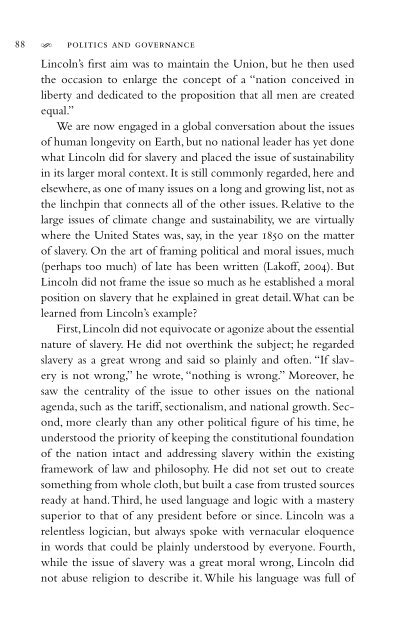Down to the wire : confronting climate collapse / David - Index of
Down to the wire : confronting climate collapse / David - Index of
Down to the wire : confronting climate collapse / David - Index of
Create successful ePaper yourself
Turn your PDF publications into a flip-book with our unique Google optimized e-Paper software.
S<br />
88 politics and governance<br />
Lincoln’s fi rst aim was <strong>to</strong> maintain <strong>the</strong> Union, but he <strong>the</strong>n used<br />
<strong>the</strong> occasion <strong>to</strong> enlarge <strong>the</strong> concept <strong>of</strong> a “nation conceived in<br />
liberty and dedicated <strong>to</strong> <strong>the</strong> proposition that all men are created<br />
equal.”<br />
We are now engaged in a global conversation about <strong>the</strong> issues<br />
<strong>of</strong> human longevity on Earth, but no national leader has yet done<br />
what Lincoln did for slavery and placed <strong>the</strong> issue <strong>of</strong> sustainability<br />
in its larger moral context. It is still commonly regarded, here and<br />
elsewhere, as one <strong>of</strong> many issues on a long and growing list, not as<br />
<strong>the</strong> linchpin that connects all <strong>of</strong> <strong>the</strong> o<strong>the</strong>r issues. Relative <strong>to</strong> <strong>the</strong><br />
large issues <strong>of</strong> <strong>climate</strong> change and sustainability, we are virtually<br />
where <strong>the</strong> United States was, say, in <strong>the</strong> year 1850 on <strong>the</strong> matter<br />
<strong>of</strong> slavery. On <strong>the</strong> art <strong>of</strong> framing political and moral issues, much<br />
(perhaps <strong>to</strong>o much) <strong>of</strong> late has been written (Lak<strong>of</strong>f, 2004). But<br />
Lincoln did not frame <strong>the</strong> issue so much as he established a moral<br />
position on slavery that he explained in great detail. What can be<br />
learned from Lincoln’s example?<br />
First, Lincoln did not equivocate or agonize about <strong>the</strong> essential<br />
nature <strong>of</strong> slavery. He did not overthink <strong>the</strong> subject; he regarded<br />
slavery as a great wrong and said so plainly and <strong>of</strong>ten. “If slavery<br />
is not wrong,” he wrote, “nothing is wrong.” Moreover, he<br />
saw <strong>the</strong> centrality <strong>of</strong> <strong>the</strong> issue <strong>to</strong> o<strong>the</strong>r issues on <strong>the</strong> national<br />
agenda, such as <strong>the</strong> tariff, sectionalism, and national growth. Second,<br />
more clearly than any o<strong>the</strong>r political fi gure <strong>of</strong> his time, he<br />
unders<strong>to</strong>od <strong>the</strong> priority <strong>of</strong> keeping <strong>the</strong> constitutional foundation<br />
<strong>of</strong> <strong>the</strong> nation intact and addressing slavery within <strong>the</strong> existing<br />
framework <strong>of</strong> law and philosophy. He did not set out <strong>to</strong> create<br />
something from whole cloth, but built a case from trusted sources<br />
ready at hand. Third, he used language and logic with a mastery<br />
superior <strong>to</strong> that <strong>of</strong> any president before or since. Lincoln was a<br />
relentless logician, but always spoke with vernacular eloquence<br />
in words that could be plainly unders<strong>to</strong>od by everyone. Fourth,<br />
while <strong>the</strong> issue <strong>of</strong> slavery was a great moral wrong, Lincoln did<br />
not abuse religion <strong>to</strong> describe it. While his language was full <strong>of</strong>
















